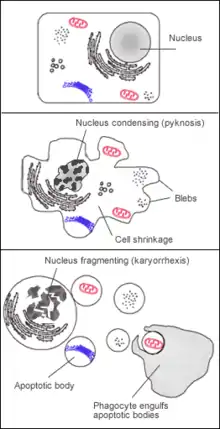apoptosis
English

sequence of events in apoptosis
Etymology
From Ancient Greek ἀπόπτωσις (apóptōsis, “a falling off”), from ἀπό (apó, “away from”) + πτῶσις (ptôsis, “falling”).
Pronunciation
Noun
apoptosis (countable and uncountable, plural apoptoses)
- (biology, cytology) A process of programmed cell death by which cells undergo an ordered sequence of events which leads to death of the cell, as occurs during growth and development of the organism, as a part of normal cell aging, or as a response to cellular injury. [from 20th c.]
- 1972, J. F. R. Kerr, A. H. Wyllie, A. R. Currie, “Apoptosis: A Basic Biological Phenomenon with Wide-ranging Implications in Tissue Kinetics”, in British journal of cancer, volume 26, :
- The term apoptosis is proposed for a hitherto little recognized mechanism of controlled cell deletion, which appears to play a complementary but opposite role to mitosis in the regulation of animal cell populations.
- 1999, Matt Ridley, Genome, Harper Perennial, published 2004, page 238:
- Indeed, so important is apoptosis that it is gradually becoming clear that almost all therapeutic cancer treatment works only because it induces apoptosis by alerting p53 and its colleagues.
- 2011, Terence Allen, Graham Cowling, The Cell: A Very Short Introduction, Oxford, page 74:
- Apoptosis is routine in developmental processes such as the removal of webbing between fingers in humans, the loss of tadpole tails in amphibians, and insect metamorphosis.
Hypernyms
Coordinate terms
Derived terms
Translations
death of cells
|
Spanish
Further reading
- “apoptosis”, in Diccionario de la lengua española, Vigésima tercera edición, Real Academia Española, 2014
This article is issued from Wiktionary. The text is licensed under Creative Commons - Attribution - Sharealike. Additional terms may apply for the media files.